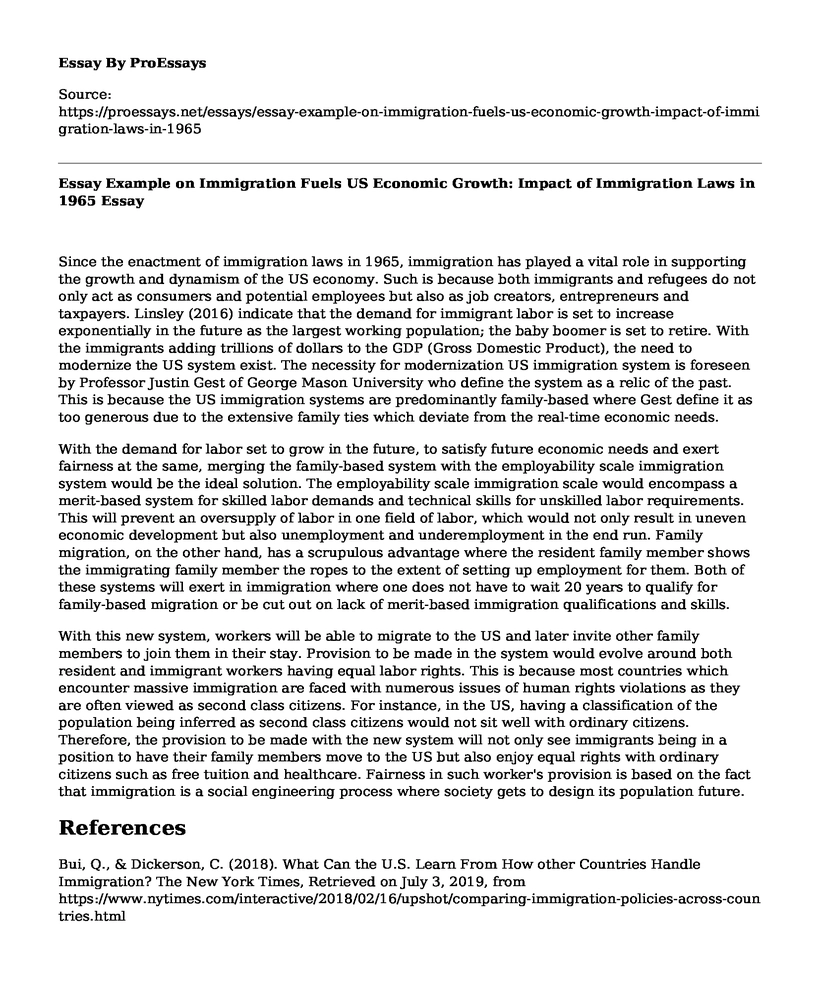Since the enactment of immigration laws in 1965, immigration has played a vital role in supporting the growth and dynamism of the US economy. Such is because both immigrants and refugees do not only act as consumers and potential employees but also as job creators, entrepreneurs and taxpayers. Linsley (2016) indicate that the demand for immigrant labor is set to increase exponentially in the future as the largest working population; the baby boomer is set to retire. With the immigrants adding trillions of dollars to the GDP (Gross Domestic Product), the need to modernize the US system exist. The necessity for modernization US immigration system is foreseen by Professor Justin Gest of George Mason University who define the system as a relic of the past. This is because the US immigration systems are predominantly family-based where Gest define it as too generous due to the extensive family ties which deviate from the real-time economic needs.
With the demand for labor set to grow in the future, to satisfy future economic needs and exert fairness at the same, merging the family-based system with the employability scale immigration system would be the ideal solution. The employability scale immigration scale would encompass a merit-based system for skilled labor demands and technical skills for unskilled labor requirements. This will prevent an oversupply of labor in one field of labor, which would not only result in uneven economic development but also unemployment and underemployment in the end run. Family migration, on the other hand, has a scrupulous advantage where the resident family member shows the immigrating family member the ropes to the extent of setting up employment for them. Both of these systems will exert in immigration where one does not have to wait 20 years to qualify for family-based migration or be cut out on lack of merit-based immigration qualifications and skills.
With this new system, workers will be able to migrate to the US and later invite other family members to join them in their stay. Provision to be made in the system would evolve around both resident and immigrant workers having equal labor rights. This is because most countries which encounter massive immigration are faced with numerous issues of human rights violations as they are often viewed as second class citizens. For instance, in the US, having a classification of the population being inferred as second class citizens would not sit well with ordinary citizens. Therefore, the provision to be made with the new system will not only see immigrants being in a position to have their family members move to the US but also enjoy equal rights with ordinary citizens such as free tuition and healthcare. Fairness in such worker's provision is based on the fact that immigration is a social engineering process where society gets to design its population future.
References
Bui, Q., & Dickerson, C. (2018). What Can the U.S. Learn From How other Countries Handle Immigration? The New York Times, Retrieved on July 3, 2019, from https://www.nytimes.com/interactive/2018/02/16/upshot/comparing-immigration-policies-across-countries.html
Nicholson, M. D. (2017). The Facts on Immigration Today: 2017 Edition. Center for American Progress, Retrieved on July 3, 2017, from https//www.americanprogress.org/issues/immigration/reports/2017/04/20/430736/facts-immigration-today-2017-edition/
Cite this page
Essay Example on Immigration Fuels US Economic Growth: Impact of Immigration Laws in 1965. (2023, Jan 26). Retrieved from https://proessays.net/essays/essay-example-on-immigration-fuels-us-economic-growth-impact-of-immigration-laws-in-1965
If you are the original author of this essay and no longer wish to have it published on the ProEssays website, please click below to request its removal:
- The Indicators and the International Trends of Inequality in the U.S. - Paper Example
- Essay Example on What My Bike Had Taught Me About White Privilege
- Impact of the Great Depression on United States Culture - Essay Sample
- Essay Sample on Bugsy & Little Man: Uncovering the Criminal Underworld of Meyer Lansky
- Essay Example on Frank Jones' Team: Job Analysis for Sleep Ti
- Employee Development Programs: Boosting Engagement & Productivity - Essay Sample
- Essay Example on Ensuring Clean Water for All: A Basic Human Right







